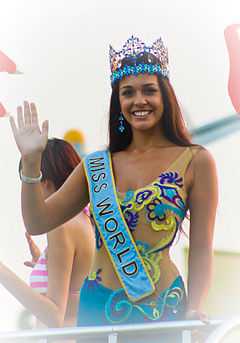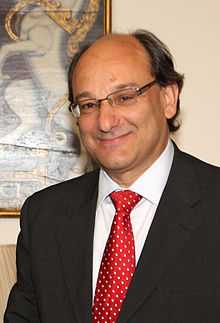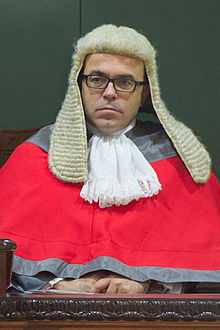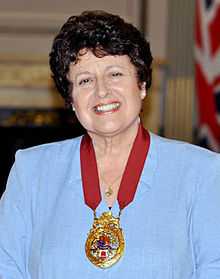Gibraltarians
| |||||||||||||||||||||
| Total population | |||||||||||||||||||||
|---|---|---|---|---|---|---|---|---|---|---|---|---|---|---|---|---|---|---|---|---|---|
| About 40,000 | |||||||||||||||||||||
| Regions with significant populations | |||||||||||||||||||||
| Languages | |||||||||||||||||||||
|
English, Spanish Llanito (vernacular) | |||||||||||||||||||||
| Religion | |||||||||||||||||||||
| Predominantly Roman Catholicism, Anglicanism | |||||||||||||||||||||
| Related ethnic groups | |||||||||||||||||||||
| British, Spanish, Andalusians, Catalans, Genoese, Maltese, Portuguese | |||||||||||||||||||||

The Gibraltarians (colloquially Llanitos) are a cultural group native to Gibraltar, a British overseas territory located near the southernmost tip of the Iberian Peninsula at the entrance to the Mediterranean Sea.
Origins
Gibraltarians are a racial and cultural mixture of the many immigrants who came to the Rock of Gibraltar over three hundred years. They are the descendants of economic migrants who came to Gibraltar following its capture by an Anglo-Dutch force in 1704. All but 70 of the existing population of 4,000 fled to the surrounding Campo de Gibraltar.[4]
Most Gibraltarian surnames are typically of Mediterranean extraction. The exact breakdown is as follows:
| Rank | Origin | Proportion (%) of family names on 1995 electoral register[5] |
|---|---|---|
| 1 | British | 27% |
| 2 | Spanish (excluding Minorcan) | 24% |
| 3 | Italian | 19% |
| 4 | Portuguese | 11% |
| 5 | Maltese | 8% |
| 6 | Jewish | 3% |
| 7 | Minorcan | 2% |
| 8 | Other | 4% |
| 9 | Unassigned | 2% |
Genoese and Catalans (who arrived in the fleet with Prince George of Hesse-Darmstadt) became the core of Gibraltar's first civilian population under Habsburg Gibraltar. Sephardi Jews from Tetouan in Morocco, who had previously been suppliers to the English territory of Tangier, began supplying fresh produce to Gibraltar in 1704.
Jews in Gibraltar by 1755 together with the Genoese formed 50% of the civilian population (then 1,300). In 1888 construction of the new harbour at Gibraltar began to provide an additional coaling station on the British routes to the East. This resulted in the importation of Maltese labour both to assist in its construction, and to replace striking Genoese labour in the old coaling lighter-based industry. Maltese and Portuguese people formed the majority of this new population. Other groups include Minorcans (due to the links between both British possessions during the 18th century; immigration began in that century and continued even after Minorca was returned to Spain in 1802 by the Treaty of Amiens),[6][7] Sardinians, Sicilians and other Italians, French, and British people.
Immigration from Spain (like the exiles from the Spanish Civil War) and intermarriage with Spaniards from the surrounding Spanish towns was a constant feature of Gibraltar's history until General Francisco Franco closed the border with Gibraltar, cutting off many Gibraltarians from their relatives on the Spanish side of the frontier. The Spanish government reopened the land frontier, but other restrictions remain in place.
Nationality
Gibraltarians are British citizens, albeit with a distinct identity of their own.
noun: Gibraltarian(s) adjective: Gibraltar
| Rank | Nationality | Proportion (%) of the population (2001)[8] |
|---|---|---|
| 1 | Gibraltarian | 83.22% |
| 2 | Other British | 9.56% |
| 3 | Moroccan | 3.50% |
| 4 | Spanish | 1.19% |
| 5 | Other | 1.54% |
| 6 | Other EU | 1.00% |
Estimates for 2008 show a small decrease in the proportion of Gibraltarians (81.12%), a significant increase in the ratio of "Other British" (11.09%) and a small increase in the ratio of "Other" (7.79%). No further breakdown is provided in this figure.[1]
Culture

Religion
The main religion of Gibraltar is Christianity with the majority of Gibraltarians belonging to the Roman Catholic Church. Other Christian denominations include the Church of England, the Gibraltar Methodist Church,[9] the Church of Scotland, various Pentecostal and independent churches mostly influenced by the House Church and Charismatic movements, as well as a Plymouth Brethren congregation. There is also a ward of The Church of Jesus Christ of Latter-day Saints, and Jehovah's Witnesses. There are a number of Hindu Indians, a Moroccan Muslim population, members of the Bahá'í Faith[10] and a long-established Jewish community.[11][12]
| Rank | Religion | Proportion (%) of Gibraltarians[8] |
|---|---|---|
| 1 | Roman Catholic | 78.09% |
| 2 | Church of England | 6.98% |
| 3 | Muslim | 4.01% |
| 4 | Other Christian | 3.21% |
| 5 | None | 2.86% |
| 6 | Jewish | 2.12% |
| 7 | Hindu | 1.79% |
| 8 | Other or unspecified | 0.94% |
Languages
English (used in schools and for official purposes) and Spanish are the main languages of Gibraltar. Although English is the official language, Gibraltarians are typically bilingual, speaking Spanish as fluently as English.[13] Most Gibraltarians converse in Llanito, Gibraltar's vernacular. It is mostly based on Andalusian Spanish mixing British English as well as languages such as Genoese Ligurian, Maltese, Portuguese and Haketia. Gibraltarians may also code-switch to English. Hebrew is spoken by the significant Jewish community. Arabic is also spoken by the Moroccan community, similar to Hindi and Sindhi being spoken by the Indian community of Gibraltar. Maltese is still spoken by some families of Maltese descent.
See also
| Wikimedia Commons has media related to People of Gibraltar. |
- List of Gibraltarians
- Gibraltarians in the United Kingdom
- Genoese in Gibraltar
- Gibraltarian status
- Demographics of Gibraltar
- History of Nationality in Gibraltar
References
- ↑ 1.0 1.1 Abstract of Statistics 2008
- ↑ 2.0 2.1 2.2 "Country-of-birth database". Organisation for Economic Co-operation and Development. Retrieved 21 June 2009.
- ↑ Appearance of the Minister of Foreign Affairs of Spain under the Foreign Affairs Commission (Senate of Spain), 5 October 2006.
- ↑ Gold, Peter (2005). Gibraltar: British or Spanish?. Routledge. p. 2.
- ↑ Edward G. Archer (2006). "Ethnic factors". Gibraltar, identity and empire. Routledge. p. 36. ISBN 978-0-415-34796-9.
- ↑ Jackson, William (1990). The Rock of the Gibraltarians. A History of Gibraltar (second ed.). Grendon, Northamptonshire, UK: Gibraltar Books. p. 225. ISBN 0-948466-14-6.
The open frontier helped to increase the Spanish share, and naval links with Minorca produced the small Minorcan contingent.
- ↑ Edward G. Archer (2006). Gibraltar, identity and empire. Routledge. pp. 42–43. ISBN 978-0-415-34796-9.
- ↑ 8.0 8.1 Census of Gibraltar 2001
- ↑ "Gibraltar Methodist Church". The Methodist Church. Retrieved 30 October 2007.
- ↑ "National Baha'i Communities | The Bahá’í Faith". Bahai.org. Retrieved 13 May 2013.
- ↑ "People". Official Government of Gibraltar London website. 2005. Archived from the original on 13 October 2007. Retrieved 6 November 2007.
- ↑ Jacobs, Joseph. "Gibraltar". JewishEncyclopedia.com. Retrieved 6 November 2007.
- ↑ "Language of Gibraltar".
| ||||||||||||||||||||||||||||||||||||||||||||||||||||||||||||||||||||||||||||||||||||||||||||||||||||||||||||||||||||||||







_(2)-2.jpg)









.jpg)
